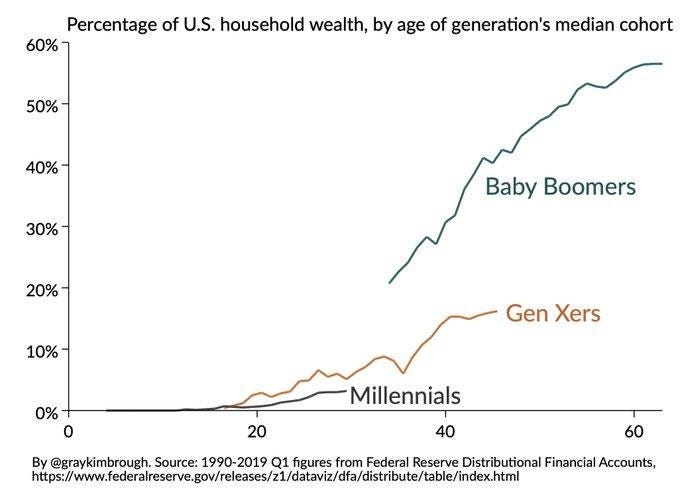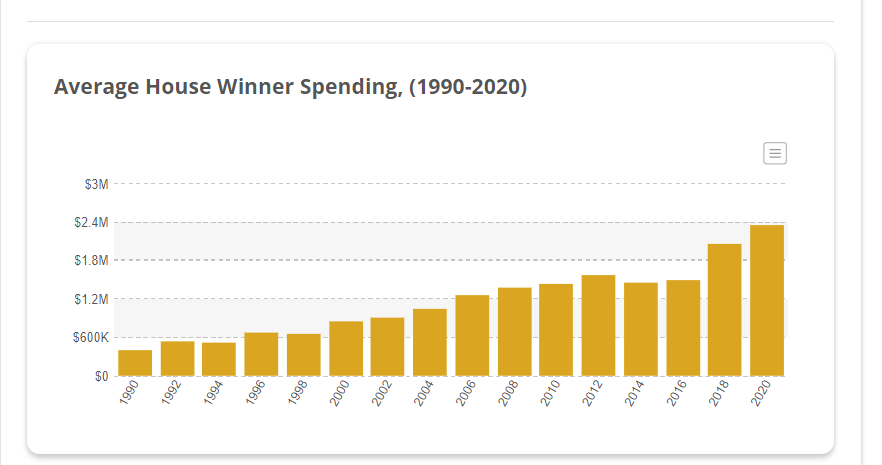Dems are the f*cking worst, part 2
How the Baby Boomer cash hoarding approach is causing problems in the Democratic Party.
Money isn’t just getting hoarded by Baby Boomers in the economy at large but by Democratic consultants as well. In the first of a three-part series, pollster Stefan Hankin explained why Democrats keep falling for race baiting. In his second installment, Hankin challenges the self-image of the Democratic Party as innovative and youth-oriented.
by Stefan Hankin
A few weeks ago, we took a look at how Democrats are just the fucking worst when it comes to taking the bait on culture wars issues (especially when it comes to race) and the party’s overall inability to message their way out of a paper bag. As discussed, the failure to adapt to the new “norm” of the GOP’s use of race baiting and culture issues goes back to the mid 1960’s and the signing of the Civil Rights Bill by President Lyndon Baines Johnson. The inability to recognized and adapt has caused challenges which have been compounding on itself for five or six decades now.
The path to where we are is infuriating, but the fact that previous generations have done nothing to change the approach is inexcusable.
Generational finger pointing has been happening since time began. It is human nature to look at the generation below, roll your eyes and express how the youth just don’t understand what it was like, how to dress, or have the ability to walk uphill in the snow both to and from school. At the same time the younger generations just sit in amazement as older people are unable to program VCR’s, understand “New Math,” and ruin any social media platform they can get their hands on.
Say what you will about their technology prowess, there are a few things that the Baby Boom generation is really good at: hoarding money and losing elections. When it comes to wealth, the Boomer generation has always done much better than any generation coming after them. Add in a nice dose of climate change, and I think we can all agree that a chorus of “gee thanks Boomer” is in order.
This hoarding of wealth is both stifling the younger generations, but also causing a dependency on the older generation. This phenomenon is also happening when it comes to innovation and our current economy. Our economy is no longer designed as an open economy, but one that is open-then-closed. The titans of our day (Microsoft, Apple, Google etc) went to market with a new idea/approach and then once success happens, they do everything in their power to close the door to competitors and stifle innovation. This is not a new concept, but given the concentration of power these companies hold over our lives, the stifling of innovation is likely at the expense of future generation. One very small example of this is how Google hoards engineers and has them working on products they know will never go to market in order to keep them away from any company that is perceived competition.
There is a similar system happening in our politics, but it is not based on starting out with a great product, instead it’s more due to the fact that there are only two products in our proverbial marketplace. With only two parties, and a majority of Americans in support of what Democrats are offering on most issues, you would think success would be baked in. But not so much.
There are a few things that the Baby Boom generation is really good at: hoarding money and losing elections.
Since 2008, the Democratic Party has had a total of one “good election,” and it is tough to give credit to anyone but former President Trump for the Democratic wins in 2018. After the 2010 shellacking, barely winning seats in the House or Senate in 2012 (even though President Obama won re-election relatively easily), losing the US Senate in 2014, Trump winning in 2016, and almost losing the House in 2020, one might think that we as a party would be looking for a new approach. But don’t worry, if there is one thing we are good at, it is not learning lessons.
Part of the issue is the advice and ideas for the party are coming from a decidedly different “generation.” The party tends to look backwards to a perceived success and then block out ideas that work counter to the narrative of “we are smart, just look what we did X number of years ago.” Sadly, this is not a new issue. Bill Clinton wins election in 1992 and then moving forward campaign approaches were modeled off this win. Very little consideration is given to what dynamics were happening at the time or the fact that changes in the world we live are moving faster and faster. This gives us the GOP take over in 1994 and George W. Bush win in 2000. President Obama’s election in 2008 was groundbreaking, so we run that playbook for the next three to four elections with little success.
Say what you will about the Republican Party, but they have been morphing, advancing, and “improving on” their approach to identity politicks for decades. The various eras of Republican control took many forms. Richard Nixon’s brand of conservatism was different from Ronald Reagan’s, which was then very different from the Newt Gingrich lead version, which accelerated the movement towards the Tea Party, and then Trump over the next two decades. The end result, is our own current system of American Apartheid (also discussed in this newsletter) where the minority in this country is using the mechanisms available to them to remain in power regardless of consequences for our nation as a whole.
Now don’t get me wrong, this is not hating on people of an older generation or saying that if you are over the age of 55 then you can’t win elections. But there needs to be a discussion of whether the party truly cares about innovation and success or if we are more geared towards “generational wealth” and the open-then-closed model of business.
Over the past decade, the amount of money being spent on elections has been steadily increasing.
At the same, time the success rates of campaigns has been stagnant at best. In 2012 89.77% of House incumbents won re-election. In 2020 that number was at 94.67%. Even in the best year for Democrats, 90.96% of incumbents won re-election in 2018. That is a lot of money being spent to just keep the same chairs on the proverbial deck.
Clearly re-districting, population patterns, social media and other factors are bigger drivers of incumbent protection that the campaigns themselves, but given all these inputs, why does our answer continue to be to spend more money?
In 2008, Democrats spent $3.6 billion on federal elections; in 2020, Democrats spent, adjusted for inflation, $8.4 billion. In 2008 Obama won, Democrats picked up 21 seats in the House, and won 8 US Senate seats. In 2020, Biden won (thank God), Democrats gained three seats in the Senate, and lost 11 seats in the House. We are clearly getting better at spending money. Not so sure about that winning thing.
We are clearly getting better at spending money. Not so sure about that winning thing.
Part of the issue is the creation of the Open-then-Closed system we have set up as a party. There is a premium placed on a relatively small number of consulting firms, who then get larger and larger and begin to do whatever is needed to do to keep the money flowing in their direction. This system is the compounded by incumbents who are winning elections at a 90% rate and getting further removed from the idea that new approaches are needed since all they are living is success.
This creates a catch-22 system where a select set of firms, often times being place on the “approved list” by incumbents who are unlikely to lose elections, get bigger to handle more work, but then need more work to be able to cover the costs of being bigger taking more and more work away from the smaller firms that would bring a new perspective to the conversation. This has gotten so bad that a recent public revelation that one of the bigger data consultants in the Democratic Party had set up a second company about a decade ago in order to work with Republican campaigns. You would think this would be a deal breaker, but so far it has created no meaningful changes within the party or any loss of clients for the firm in question.
As is the case with generational wealth, and competition in our overall economy, those with the money and the marketshare will do whatever they can to hold on to what they have, and attempt to expand it. This is not new, this is not unique, but the party is looking at back at decades of questionable long-term sustained success. The question at hand is will anything change? Sadly, the answer is: probably not.
Stefan Hankin is the Founder and President of Lincoln Park Strategies. Stefan has nearly two decades of experience in market research, data analytics, communications strategy, and public opinion polling and analysis for clients that range from America’s Promise to the City of Los Angeles to Raytheon to the Southern Environmental Law Center. Follow him on Twitter at @LPStrategies.
Thanks to Noom, I lost 40 pounds and have kept it off for more than a year. Click on the blue box to get 20% off. Seriously, this works. No, this isn’t an ad. Yes, I really lost all that weight with Noom.
We set up a merch table in the back where you can get T-shirts, coffee mugs, and even tote bags now. Show the world that you’re part of The Experiment.
We’ve also got a tip jar, and I promise to waste every cent you give me on having fun, because writing this newsletter for you is some
Buy the book Texas Lt. Gov. Dan Patrick banned from the Bullock Texas History Museum: Forget the Alamo: The Rise and Fall of the American Myth by Bryan Burrough, Chris Tomlinson, and myself is out from Penguin Random House.




